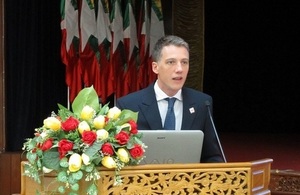Bank of England Trains Central Bank of Burma
Tony Preston, Head of Prosperity at British Embassy gave opening remarks at Bank of England training at Central Bank of Burma on 22 October.

Tony Preston, Head of Prosperity, British Embassy Rangoon
OPENING REMARKS BY TONY PRESTON, HEAD OF PROSPERITY, AT BANK OF ENGLAND TRAINING AT CENTRAL BANK RANGOON, 0900hrs 22 OCTOBER 2014
Distinguished guests, ladies and gentlemen, I am honoured to be speaking at the opening of this workshop on Central Bank policy implementation. I would like to thank the Central Bank for hosting this event and for the Bank of England for having travelled so far to deliver it.
The UK wants to encourage and support this country’s efforts to remove barriers to becoming a functioning, prosperous, sustainable economy benefitting all of its people and regions.
In terms of UK support for financial sector and banking reform, we have formed the UK Financial Services Taskforce, comprising Standard Chartered Bank, Prudential Insurance, Allen&Overy, and the British Embassy. The vision of the Taskforce is to support the holistic development of your financial sector; focusing specifically on:
• Helping the local industry to develop appropriate new financial products and services focused on the provision of credit.
• Advising on suitable regulatory structures to support the sector.
• And developing effective education, training and qualifications to build capacity
In addition to the work of the Taskforce, we are also working to develop the domestic accountancy, tax and auditing capabilities, support the strengthening of financial crime regimes and enforce sound transparent public financial management.
But this week we are very pleased to be welcoming The Bank of England, which is the central bank of the United Kingdom. Sometimes known as the “Old Lady” of Threadneedle Street, the Bank was founded in 1694 with a founding charter that stated its purpose was to “promote the public good and benefit of our people”. The Bank of England’s purpose today reflects that vision. Its mission: to promote the good of the people by maintaining monetary and financial stability.
I can see clear parallels with the stated intentions of H.E. President Thein Sein’s Government – to make government more transparent and accountable, and to ensure that structures are in place for sustained economic growth. Supervision of the domestic banking sector here is becoming increasingly important – particularly in the light of the institutional change brought about by Central Bank independence, the raft of new laws, new technologies such as mobile banking, nearly 200 recently registered microfinance institutions, new state banks being created and banks entering the market.
As Central Bank staff you are at the centre of a great period of change. Change that the UK wants to support. This is why I’m so happy that today’s workshop has been made possible. The Bank of England itself has been through periods of change. In 1997 the UK Parliament voted to give the Bank operational independence with a clear remit to pursue price stability – this has been the most significant challenge facing macroeconomic policymaking for the previous two decades. So in the Bank of England you have colleagues here with valuable experience to share – please make the most of it. This isn’t the Bank’s first trip, and I’m sure it won’t be the last.